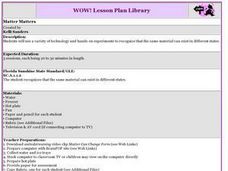Curated OER
How Does Water Cool?
How fast does water cool? First fifth graders will draw a line on a graph that predicts how fast they think water can cool from boiling. Then they plot the actual data on the same graph to see if their estimate was correct.
Curated OER
Cool Stuff
Young scientists must place a check mark next to the answer they think is correct regarding things that are warm, cool, hard, and soft. This would be a good way to begin discussing how some things actually change states of matter...
Curated OER
For a Change
Here is a instructional activity that has young scientists think about things that been changed as a result of heating and cooling, and if they can be returned to their original form. There are seven scenarios to consider, and they must...
Curated OER
Student Reading - The Unique Properties of Water
Without water there would be no life on this planet. Biology learners find out why by reading this handout. Create a worksheet of questions to answer after the reading. Follow it up with quick demonstrations or laboratory activities that...
Curated OER
Heating and Cooling Curves
High schoolers experiment with a pure substance and a phase change. In this heating and cooling curves lesson plan, students study the effects of heating and cooling a pure substance to observe a phase change. They determine both the...
Curated OER
Heat Energy - Energy Transfer
Here's a great selection of slides for a class being introduced to heat transfer. Types of materials that are good conductors or insulators are covered and the diagrams that accompany the information should make understanding more...
Curated OER
Heating and Cooling Materials
When an object is heated or cooled, a change occurs. Learners will work through this presentation and decide whether or not the changes are reversible. They learn about heating and cooling, then assess changes that have taken place. This...
Curated OER
Sand or Rock? Finding Out From 1,000 km
Students observe how measurements are made with different instruments. In this remote sensing lesson students investigate the physical state of surfaces including the surfaces of the solar system.
Curated OER
Skin and Sports
The topic is protecting our own protective covering: the skin. In particular, the information deals with sweating as a means of temperature regulation and the need to wear clothing appropriate for allowing the process to occur. Learners...
Curated OER
Cooling With Sunshades
Students conduct research in order to find the effects of properties exposed to heat and how they change temperature. They consider the effect of sunlight upon objects that are placed outside with the help of an experiment. They also...
Curated OER
Temperature School
Students observ the cooling and warming of room temperature, hot, and ice cold cans of water by measuring the change in temperature over time. They then attempt to develop explanations for the observations made and apply their findings...
Curated OER
Matter Matters!
Second graders experiment with heating and cooling and research the states of matter (solid, liquid, gas).
Curated OER
Keeping Warm
Students participate in an online activity to determine how objects heat and cool. They determine what objects best serve as thermal insulators.
Curated OER
Hot and Cold Colors
Students explore the effect of heating and cooling on the dispersal of food coloring in water.
Curated OER
Changing State
Young scholars participate in an online activity to investigate the effects of cooling and heating on water.

















